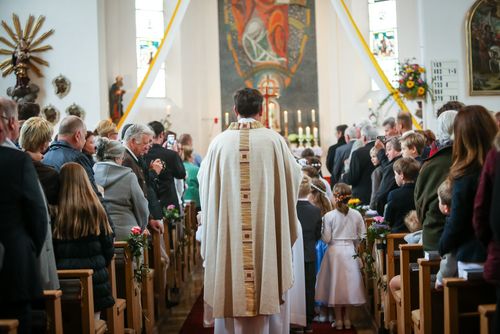 In 1802, Thomas Jefferson created the phrase “separation of church and state” in a letter addressed to Danbury Baptist Association in Connecticut. Though the first amendment does not use this phrase, Mr. Jefferson employed it to express an understanding of the function and intent of the Free Exercise Clause. Since then, the saying has been used to guide everything from public school teachings to the allocation of government funding to the development of bylaws. Most recently, church leaders are calling on the First Amendment to protect their rights to host church services during the COVID-19 outbreak.
In 1802, Thomas Jefferson created the phrase “separation of church and state” in a letter addressed to Danbury Baptist Association in Connecticut. Though the first amendment does not use this phrase, Mr. Jefferson employed it to express an understanding of the function and intent of the Free Exercise Clause. Since then, the saying has been used to guide everything from public school teachings to the allocation of government funding to the development of bylaws. Most recently, church leaders are calling on the First Amendment to protect their rights to host church services during the COVID-19 outbreak.
Church Services Deemed “Essential Activities”
On Monday, March 30th — more than two weeks after Florida Governor Ron DeSantis banned large gatherings — one megachurch pastor was arrested for defying orders and holding church services. In response, the pastor complained that he was a victim of a “tyrannical government.” Apparently, this pastor wasn’t the only one who issued a complaint, because as of Monday, April 6th, a concerted effort to protect religious freedoms is playing out across the country.
Following the pastor’s cries of being victimized, DeSantis was quick to issue additional executive orders. Per these orders, local governments are prohibited from banning religious services of any size. In his statement, he indicated that he does not believe the government has the power to force churches to close, and that he himself would not be responsible for doing that. He then went on to say that during the time of Lenten, people have the right to access religious services.
He is not the only governor to feel this way. In jurisdictions that lead the nation in the number of COVID-19 cases, churches are still open for business despite explicit stay-at-home orders. Those include Michigan, Florida and Texas. In states that do not have stay-at-home orders but that have closed non-essential businesses, churches, mosques, synagogues, temples and other houses of worship did not make the cut. Greg Abbott, the governor of Texas, went so far as to sign an executive order that makes church services an “essential activity.”
States that have delivered exceptions for religious services despite a growing number of coronavirus cases include Delaware, Michigan, Louisiana, New Hampshire, Mississippi, West Virginia and Tennessee. According to one group, the reasoning behind the push for the allowance of religious services is simple: Something is seriously wrong with a society that allows liquor stores and abortion clinics to stay open but that closes down places of worship.
Many Believers Choose To Worship From Home
Despite the defiance of churches across the globe, many people are heeding the warnings of public health officials and continuing to worship from home — even if their place of worship remains open and active. In fact, leaders of some of the nation’s largest religions, including Catholicism, Mormonism and various denominations of Judaism, have closed their houses of worship and are urging followers to “attend” services online. Per Christianity Today, leaders’ decisions to host online services come not from a casual disregard for faith but rather from a place of love. Though church leaders do agree that phone calls and text messages are inferior to in-person service, they also believe that, during this scary time, the Lord is more than okay with the alternative for the time being.
It is true that the ability to gather for religious worship is part of our first amendment right. However, just as all our other constitutional freedoms have been narrowed for the sake of public safety, so too must our right to religious freedom take a backseat. Now is not the time to chase argumentative claims regarding religious persecution. Now is the time to lead by example and with love and to find alternative ways to practice our faith, at least for now.



